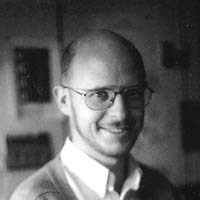"[People] like themselves just as they are," says Marvin Minsky. "Perhaps they are not selfish enough, or imaginative, or ambitious. Myself, I don't much like how people are now. We're too shallow, slow, and ignorant. I hope that our future will lead us to ideas that we can use to improve ourselves."
Marvin believes that it is important that we "understand how our minds are built, and how they support the modes of thought that we like to call emotions. Then we'll be better able to decide what we like about them, and what we don't—and bit by bit we'll rebuild ourselves."
Marvin Minsky is the leading light of AI—artificial intelligence, that is. He sees the brain as a myriad of structures. Scientists who, like Minsky, take the strong AI view believe that a computer model of the brain will be able to explain what we know of the brain's cognitive abilities. Minsky identifies consciousness with high-level, abstract thought, and believes that in principle machines can do everything a conscious human being can do.
"Marvin Minsky is the smartest person I've ever known," computer scientist and cognitive researcher Roger Schank points out. "He's absolutely full of ideas, and he hasn't gotten one step slower or one step dumber. One of the things about Marvin that's really fantastic is that he never got too old. He's wonderfully childlike. I think that's a major factor explaining why he's such a good thinker. There are aspects of him I'd like to pattern myself after. Because what happens to some scientists is that they get full of their power and importance, and they lose track of how to think brilliant thoughts. That's never happened to Marvin."
MARVIN MINSKY is a mathematician and computer scientist; Toshiba Professor of Media Arts and Sciences at the Massachusetts Institute of Technology; cofounder of MIT's Artificial Intelligence Laboratory, Logo Computer Systems, Inc., and Thinking Machines, Inc.; laureate of the Japan Prize (1990), that nation's highest distinction in science and technology; author of seven books, including The Society of Mind.

